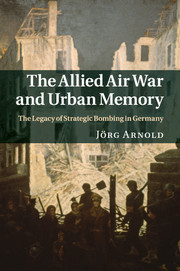Description
The Allied Air War and Urban Memory
The Legacy of Strategic Bombing in Germany
Studies in the Social and Cultural History of Modern Warfare Series
Author: Arnold Jörg
A first study in English of the cultural legacy of World War II bombing in post-war Germany.
Language: English
Subject for The Allied Air War and Urban Memory:
Approximative price 36.76 €
In Print (Delivery period: 14 days).
Add to cart
Publication date: 10-2016
Support: Print on demand
Support: Print on demand
Description
/li>Contents
/li>Biography
/li>
The cultural legacy of the air war on Germany is explored in this comparative study of two bombed cities from different sides of the subsequently divided nation. Contrary to what is often assumed, Allied bombing left a lasting imprint on German society, spawning vibrant memory cultures that can be traced from the 1940s to the present. While the death of half a million civilians and the destruction of much of Germany's urban landscape provided 'usable' rallying points in the great political confrontations of the day, the cataclysms were above all remembered on a local level, in the very spaces that had been hit by the bombs and transformed beyond recognition. The author investigates how lived experience in the shadow of Nazism and war was translated into cultural memory by local communities in Kassel and Magdeburg struggling to find ways of coming to terms with catastrophic events unprecedented in living memory.
Introduction; 1. From experience to memory; Part I. Commemorating Death: 2. 'Soldiers of the Heimat', 1940–5; 3. 'In quiet memory'? 1945–75; 4. The return of the dead, 1979–95; Part II. Confronting Destruction: 5. 'What we have lost', 1940–60; 6. From celebration to lamentation, 1960–95; Part III. Writing Histories: 7. The 'night of horror', 1940–70; 8. The 'greatest event in municipal history', 1970–95; Conclusion.
Jörg Arnold teaches Modern European History at the Albert-Ludwigs-Universität Freiburg, Germany. His publications include Luftkrieg: Erinnerungen in Deutschland und Europa (The Air War: Memories in Germany and Europe), co-edited with Dietmar Süβ and Malte Thieβen (2009).
© 2024 LAVOISIER S.A.S.




